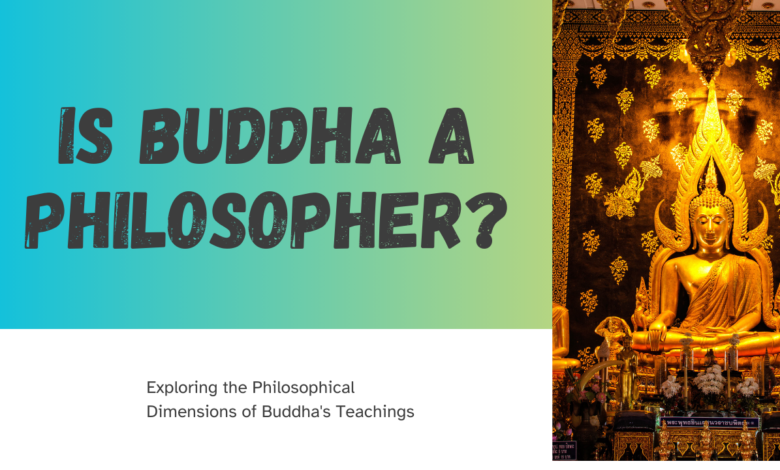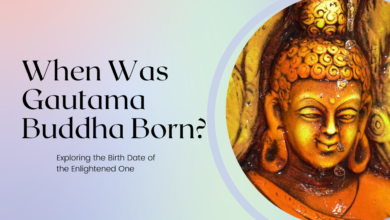
Is Buddha A Philosopher?
Buddha, whose birth name was Siddhartha Gautama, is primarily known as the founder of Buddhism. His teachings and insights form the core of Buddhist philosophy and practice.

Introduction
The distinction between philosophers and religious figures has been a subject of debate for centuries. The figure of Siddhartha Gautama, commonly known as the Buddha, is no exception. While many view him as the founder of Buddhism and a spiritual leader, others argue that he should also be recognized as a philosopher. In this article, we will explore the question of whether Buddha can be considered a philosopher, examining his teachings, philosophical principles, and the impact of his ideas on the world.
The Life and Teachings of Buddha
The first step in determining whether Buddha is a philosopher is to understand the key aspects of his life and teachings. Siddhartha Gautama was born in the 6th century BCE in what is now Nepal. He lived a life of privilege, but at the age of 29, he left his royal life in pursuit of enlightenment. After six years of meditation and self-discovery, he is said to have achieved enlightenment under a Bodhi tree. It was during this time that he expounded his teachings, which form the core of Buddhist philosophy.
Core Philosophical Principles of Buddhism
Buddha’s teachings are rooted in certain core philosophical principles. While these principles have profound religious implications, they also carry significant philosophical weight. Some of these principles include:
- The Four Noble Truths: Buddha’s foundational teaching, the Four Noble Truths, addresses the nature of suffering, its causes, and the path to liberation. This framework is fundamentally a philosophical exploration of the human condition and the means to alleviate suffering.
- The Eightfold Path: This path provides a guide for ethical and mental development. It encompasses aspects of wisdom, ethical conduct, and mental discipline, reflecting a systematic approach to human betterment and self-realization.
- Impermanence: Buddha’s assertion that all things are impermanent and subject to change raises profound philosophical questions about the nature of reality and our perceptions of it.
- Non-Self (Anatta): The concept of non-self challenges our notions of identity and individuality, urging us to contemplate the nature of the self and its relationship to the world.
Also Check
- Are Catholics and Christians the same?
- Where Is Buddhism Most Practiced?
- Do Buddhists Believe In God?
- Is Buddhism Polytheistic?
- Is Christianity a Religion?
Influence on Philosophical Thought
Buddha’s teachings have had a profound influence on the world, extending beyond the boundaries of Buddhism. Many prominent philosophers and thinkers throughout history have drawn inspiration from his ideas. For example, Arthur Schopenhauer, a 19th-century German philosopher, was greatly influenced by Buddhist thought, particularly the concept of suffering and the human will.
Additionally, the philosophical underpinnings of Buddhism, with their emphasis on mindfulness, ethics, and the pursuit of wisdom, have resonated with thinkers in the Western philosophical tradition. The concept of mindfulness, for instance, has been incorporated into various psychological and philosophical practices aimed at enhancing human well-being.
Philosophical Critiques and Debates
While some argue that Buddha’s teachings qualify him as a philosopher, others contend that the religious and spiritual aspects of Buddhism make it difficult to classify him solely as such. There is a debate about whether his teachings fit neatly into the Western philosophical tradition, which has different conventions and approaches.
Critics argue that Buddha’s emphasis on personal transformation, liberation from suffering, and religious elements place him in a different category than traditional Western philosophers who focus on metaphysics, epistemology, and ethics.
Conclusion
The question of whether Buddha is a philosopher is complex and depends on one’s perspective and interpretation. While he is primarily known as a spiritual leader and the founder of Buddhism, his teachings contain profound philosophical insights into the nature of suffering, the self, and the human condition. The impact of his philosophy extends beyond the realm of religion and has influenced philosophical thought in various ways. Ultimately, whether one considers Buddha a philosopher or not is a matter of perspective, but there is no denying the philosophical depth and significance of his teachings.

Is Buddha a Philosopher? – FAQs
What is the primary role of Buddha in Buddhism?
Buddha, whose birth name was Siddhartha Gautama, is primarily known as the founder of Buddhism. His teachings and insights form the core of Buddhist philosophy and practice.
Was Buddha a philosopher in addition to being a spiritual leader?
Yes, Buddha is often considered a philosopher because his teachings encompass a wide range of philosophical concepts, including ethics, metaphysics, and epistemology.
What were some of the key philosophical ideas taught by Buddha?
Buddha’s teachings revolve around the Four Noble Truths, the Eightfold Path, and the concept of impermanence. These ideas address the nature of suffering, its causes, and the path to liberation from suffering.
How do Buddha’s philosophical teachings differ from other philosophers?
Buddha’s philosophy is unique in its focus on alleviating suffering and attaining enlightenment (nirvana) rather than traditional Western philosophical inquiries. While there are parallels with certain philosophical concepts, the ultimate goal of his teachings is spiritual liberation.
Did Buddha engage in philosophical debates with other thinkers of his time?
Buddha was known to engage in debates with various philosophical schools of thought in ancient India. He often employed logical reasoning and discourse to convey his teachings.
Is Buddhism purely a religion or a philosophy?
Buddhism is a complex system that includes both religious and philosophical elements. While it encompasses religious rituals, beliefs, and spiritual practices, it is also founded on a substantial philosophical framework.
Can one study Buddha’s philosophy independently of Buddhism as a religion?
Yes, one can study and appreciate the philosophical aspects of Buddhism without necessarily adhering to its religious practices. Many people engage with Buddhist philosophy for its ethical and philosophical insights.
What is the relevance of Buddha’s philosophy in the modern world?
Buddha’s philosophy continues to be relevant today as it provides guidance on issues such as suffering, the human condition, and the pursuit of a meaningful and compassionate life.
How can one explore Buddha’s philosophical teachings for personal growth and well-being?
Individuals interested in Buddha’s philosophy can read Buddhist texts, attend lectures or workshops, and even practice meditation to gain a deeper understanding of his teachings and their practical applications.
Is the study of Buddha’s philosophy limited to Buddhists, or can anyone benefit from it?
Buddha’s philosophy is not restricted to Buddhists; anyone with an interest in philosophy, spirituality, or personal growth can benefit from exploring his teachings and applying their principles in their lives.


